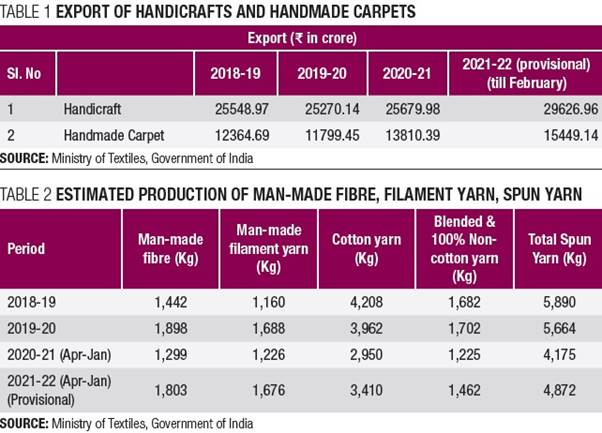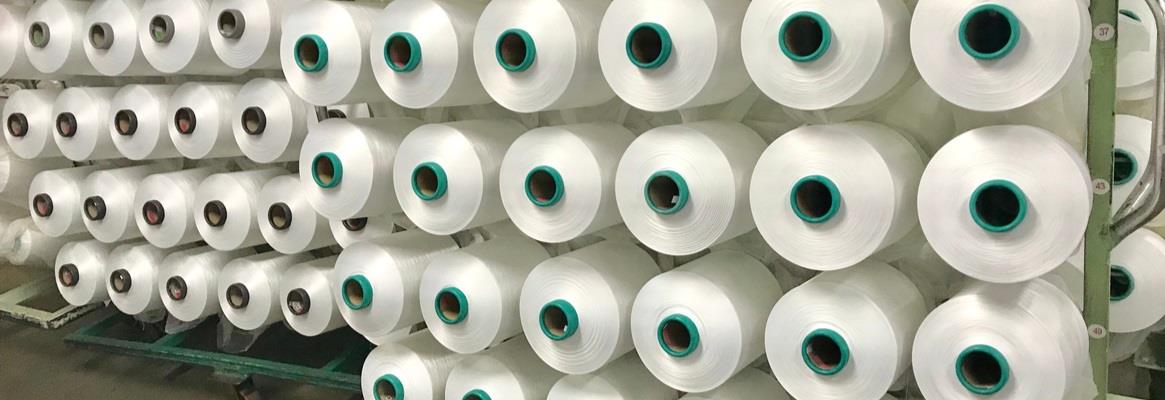In order to overcome the challenges faced during the COVID-19 pandemic, the Indian government took several major initiatives/measures to boost exports, production, demand and job opportunities in the textile sector.
Removal of anti-dumping duty: To boost exports in man-made fibre (MMF) sector, the government removed anti-dumping duty on PTA (Purified Terephthalic Acid), Viscose Staple Fibre and Acrylic.
PM MITRA scheme: The government approved setting up of Seven Pradhan Mantri Mega Integrated Textile Region and Apparel (PM MITRA) Parks in Greenfield/Brownfield sites with an outlay of ₹4,445 crore for a period of seven years up to 2027-28. These parks will enable the Indian textile industry to become globally competitive, attract large investment and boost employment generation, according to the ministry of textiles.
PLI scheme: The government approved the Production Linked Incentive (PLI) scheme for textiles, with an approved outlay of ₹10,683 crore, to promote production of MMF apparel, MMF fabrics and products of technical textiles in the country. This is expected to enable India’s textile sector to achieve size and scale and to become competitive.
RoSCTL extension: The scheme of Rebate of State and Central Taxes and Levies (RoSCTL), that was effective from March 2019, has been extended till March 31, 2024 for exports of apparel/garments and made-ups in order to make the Indian textile sector competitive in the international market.
Research in technical textiles: An outlay of ₹1000 crore was made for advanced research and innovation in technical textiles at par with the best in the world. Research topics in 94 categories covering specially fibres and composites, geo textiles, agro textiles, protective textiles, medical textiles, defence textiles, sports textiles, and environmentally friendly / biodegradable technical textiles have been identified and research proposals have been invited. By mid-March 2022, thirty-one (31) research projects have been approved to various research institutes, including the IITs (Indian Institute of Technology), DRDO (Defence Research & Development Organisation), CSIR (Council of Scientific and Industrial Research) and Textiles Research Associations, with total estimated cost of ₹110 crore.
Promotion of technical textiles: The government is making all efforts to promote technical textiles, including mandatory use of 92 items by government organisations covering agriculture, horticulture, highways, railways, water resources, and medical applications, 100 new Indian Standards in the pipeline, and introduction of six new courses and another new 20 courses are under preparation in Technical Textiles.
Additional schemes: In addition, the government is implementing various schemes, viz the Amended Technology Upgradation Fund Scheme (A-TUFS), Scheme for the development of the Powerloom Sector (Power-Tex), Scheme for Integrated Textile Parks (SITP), SAMARTH - The Scheme for Capacity Building in Textile Sector, Jute (ICARE - Improved Cultivation and Advanced Retting Exercise), Integrated Processing Development Scheme (IPDS), Silk Samagra, National Handloom Development Programme, National Handicraft Development Programme, Integrated Wool Development Programme (IWDP), etc catering exclusively for promotion and development of textile sector on pan-India basis.
The export of handicrafts products including handmade carpets in the 2021-22 has shown positive growth as compared to the previous three years.

The outcome:
As a result of the several initiatives taken by the government, textile production and exports from India have performed better in recent months. The export of textiles and apparel from India during April-January 2021-22 stood at $34.459 billion, posting a growth of 49 per cent over $23.137 billion in the same period in 2020-21.
Handicraft exports: The export of handicrafts products including handmade carpets in the 2021-22 has shown positive growth as compared to the previous three years. The government has taken several steps in promoting the export of handicrafts. In addition to several standard International Marketing events, virtual marketing events have been also organised to provide international marketing platform to the artisans. Domestic marketing events like Gandhi Shilp Bazaar, Craft Bazaar and exhibitions are organised to provide domestic marketing platform to the artisans.











Comments